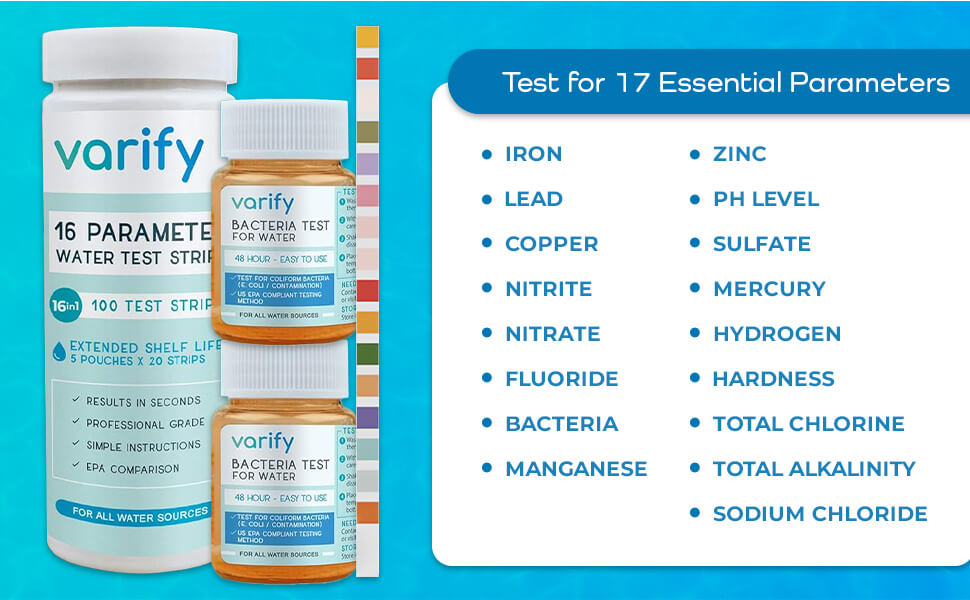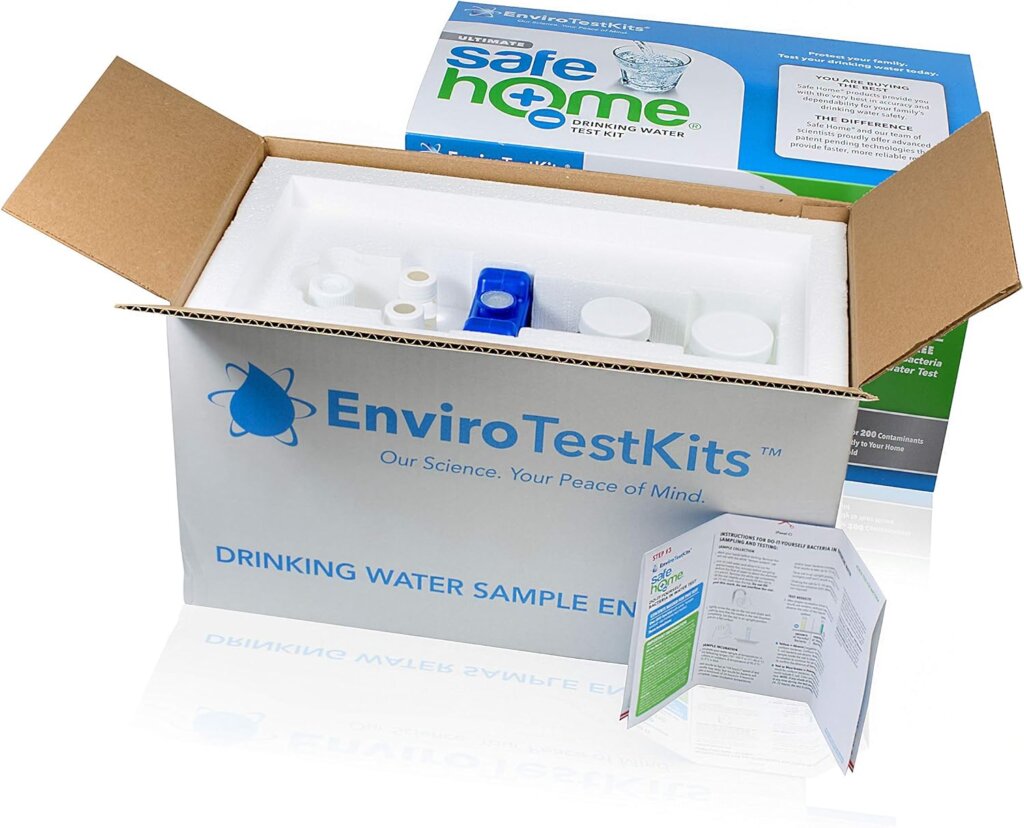Water enriched with minerals like calcium and magnesium can adversely affect your household and appliances, leading to issues such as scale buildup and skin dryness. A water hardness test kit serves as a vital tool in accurately measuring mineral content, enabling proactive measures to prevent further damage.
Our Top Picks: Best Water Hardness Test Kit
Deciding on the perfect water test kit can be overwhelming, given the countless options available. That’s why we’ve meticulously tested a wide range of kits to bring you unbiased insights. Our comprehensive reviews delve into each kit’s specific testing capabilities, user-friendliness, accuracy, and ideal applications. Whether you’re concerned about contaminants in your drinking water, maintaining a healthy pool, or assessing your well water quality, we’ve got you covered. Discover which water test kit is the ideal match for your needs and safeguard your water supply with confidence.
1. Safe Home 200-in-1 ULTIMATE Drinking Water Test Kit
The Safe Home Ultimate drinking water test kit sets a new standard for those serious about their water quality. With an impressive capability to test 200 different parameters, it leaves no aspect of water purity unchecked. From basic physical attributes to a wide array of potential contaminants such as metals, pesticides, and volatile organics, this kit offers a comprehensive analysis. By sending collected samples to an EPA-certified lab, users can trust in the expertise of certified professionals to deliver detailed results promptly online, usually within a week.
While the initial cost may be significant, the depth and breadth of information provided are invaluable for making informed decisions about water safety. The kit simplifies the testing process with clear instructions for sample collection, sealing, and shipping. Moreover, it includes educational resources that empower users to understand their results fully. Whether for home use or professional purposes, the Safe Home Ultimate kit is an ideal choice for anyone seeking the utmost assurance in water purity and quality assessment.
- Package Dimensions : 16.5 x 9.5 x 9.5 inches; 3 Pounds
- Date First Available : November 30, 2016
- Manufacturer : EnviroTestKits®
- Compatible water type: All water sources
Pros :
- Comprehensive Testing: Covers a vast array of contaminants, providing a thorough analysis of water quality.
- EPA-Certified Lab Testing: Ensures accurate and reliable results from a trusted source.
- Detailed Reporting: Offers clear and informative reports on water quality, including potential health risks.
- User-Friendly Process: Simple sample collection and shipping, making it accessible to everyone.
- Educational Resources: Provides valuable information to help understand results and take appropriate actions.
- Quick Results: Delivers test results within a week, allowing for prompt action if necessary.
Cons :
- High Cost: The comprehensive testing and lab analysis come at a premium price, making it a significant investment.
- Complex Results: The detailed report may contain technical terms and require some scientific understanding to fully interpret.
2. Tap Score Advanced Water Test Kit: A Detailed Review
Ideal Use: Designed for analyzing drinking water sourced from municipal supplies or private wells, especially in regions prone to agricultural or industrial contaminants.
Key Features:
- Convenience: Simple kit with pre-paid shipping for easy sample submission.
- Comprehensive Testing: Analyzes 114 water quality parameters conducted by an EPA-certified laboratory.
- Tap Score Algorithm: Unique algorithm for clear and accessible assessment of water quality.
- Detailed Analysis: Provides thorough information on contaminants and their potential health impacts.
- Recommendations: Offers practical suggestions for improving water quality based on test results.


Pros:
- Thorough Analysis: Provides extensive testing and detailed insights into water quality.
- User-Friendly: Kit includes clear instructions, making it easy to use.
- Tap Score Algorithm: Simplifies understanding of water quality assessment.
- Comprehensive Information: Offers in-depth details on contaminants found.
- Recommendations: Provides actionable steps for enhancing water quality.
Cons:
- Cost and Time: More expensive and slower compared to quick test strips.
- Frequency: Not ideal for frequent monitoring of water quality.
Overall: The Tap Score Advanced water test kit delivers comprehensive and insightful analysis of drinking water quality. While it may not be the most cost-effective option for frequent testing, it provides invaluable information on water quality and potential health risks, along with practical recommendations for improvement.
3. Varify 17 in 1 Complete Drinking Water Test Kit
The Varify Complete Drinking Water Test Kit offers an in-depth analysis of your water’s quality, covering 17 essential parameters including lead, bacteria, and other crucial indicators. Its comprehensive testing capabilities, ease of use with test strips, and affordability make it an invaluable tool for maintaining a healthy home environment through regular water quality monitoring.
Key Features:
- Extensive Testing: Covers a wide array of parameters crucial for a comprehensive evaluation of water safety.
- Convenient Test Strips: Utilizes easy-to-read color-coded strips for straightforward testing at home.
- Reliable Results: Ensures accuracy with tests that meet EPA standards, guaranteeing reliable and trustworthy outcomes.
- User-Friendly: Includes clear instructions that make it suitable for both beginners and experienced users alike.


Pros:
- Comprehensive Testing: Offers a detailed assessment of key contaminants, aiding in understanding overall water quality.
- Ease of Use: Simple and quick testing process with intuitive test strips for easy interpretation.
- Accurate: Provides dependable results that adhere to established standards for water testing.
- Cost-Effective: Affordable option for regular monitoring of drinking water quality at home.
Cons:
- Limited Scope: May not cover as wide a range of contaminants compared to more comprehensive laboratory tests.
Overall: The Original Watersafe Drinking Water Test Kit stands out as an excellent choice for those prioritizing accurate and accessible water testing at home. With its comprehensive testing capabilities and user-friendly design, it offers essential insights into water quality, ensuring you can confidently monitor and maintain safe drinking water standards.
Understanding Types of Water Hardness:
Hard water primarily consists of minerals like calcium and magnesium. Understanding the types of hardness helps in assessing its impact:
- Temporary Hardness: This type fades with heat due to minerals that precipitate out upon boiling.
- Permanent Hardness: Stubborn minerals that remain unchanged even after prolonged boiling.
The Impact of Hard Water:
The presence of hard water can lead to various challenges:
- Scale buildup on appliances and plumbing fixtures.
- Potential skin dryness and hair dullness.
Importance of Using a Best Hard Water Test Kit:
A water hardness test kit plays a crucial role in managing water quality by:
- Identifying Hard Water Issues: Assessing if hard water is causing problems.
- Selecting the Right Treatment: Choosing suitable methods such as water softeners or descalers.
- Monitoring Water Quality: Regularly testing to ensure effective treatment.
- Protecting Appliances: Preventing costly repairs and replacements.
Types of Water Hardness Test Kits
Several methods are available to determine water hardness:
- Test Strips: Quick and easy to use, although less precise.
- Liquid Reagent Kits: More accurate, capable of handling a wider range of hardness levels.
- Electronic Test Kits: Provide rapid and precise results, often with additional features like temperature readings.
Accurate measurement of water hardness involves several steps:
- Gathering Equipment: Prepare your test kit, clean water sample, and necessary containers.
- Collecting a Representative Sample: Flush the tap and collect running water in a clean container.
- Following Kit Instructions: Each kit has unique instructions; follow them meticulously.
- Performing the Test: Depending on the kit type, use test strips, add reagents, or employ electronic probes.
- Reading and Interpreting Results: Compare color changes or digital readings with provided hardness scales for accurate assessment.
Common challenges in using water hardness test kits include:
- Adherence to Instructions: Ensure each step is followed precisely to avoid errors.
- Environmental Factors: Factors like temperature and light can influence test results.
- Verification: Retesting may be necessary if results are uncertain.
Troubleshooting Specific Kits
- Color Changes in Reagent Kits: Ensure precise measurement and thorough mixing of reagents.
- Handling Test Strips: Store in a dry place and handle carefully to prevent damage to reactive areas.
Tips to improve accuracy in water hardness testing:
- Testing Multiple Sources: Assess water from different sources separately.
- Regular Testing: Monitor changes over time, especially after installing new treatment systems.
- Calibration: Regularly calibrate electronic kits to maintain accuracy.
- Understanding Hardness Levels: Familiarize yourself with hardness levels to select appropriate treatment solutions.
Maintaining Your Water Hardness Test Kit :
- Storage: Store kits in a cool, dry place away from extreme temperatures and humidity.
- Replacement: Follow manufacturer recommendations for replacing reagents and test strips.
- Cleaning: Regularly clean kits to remove residues and contaminants that could affect results.
Frequently Asked Questions (FAQs)
- Definition of Hard Water: Water with a hardness level typically above 170 ppm.
- Safety of Drinking Hard Water: Generally safe, though it may affect taste and appliance performance.
- Benefits of Soft Water: Enhances appliance efficiency and improves skin and hair condition.
- Suitability of Water Softeners: Effective for most applications, though caution is advised for drinking water due to potential sodium levels.
- Frequency of Testing: Recommended at least annually, with more frequent testing if water quality changes are suspected.
Conclusion
Understanding and managing water hardness is essential for maintaining appliance health, protecting plumbing systems, and enhancing overall water quality. Utilizing a water hardness test kit allows you to accurately assess mineral content and make informed decisions to improve your home or business environment. Always refer to specific kit instructions for precise and reliable results.



